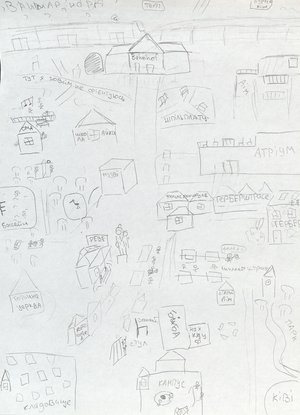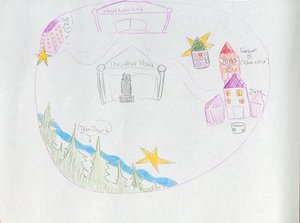
Mariam Kunchuliya
Fakultät Architektur & Urbanistik
European Urban Studies, Master
Deutschlandstipendium, gefördert von der Ernst-Abbe-Stiftung
1) Why are you studying at the Bauhaus-Universität Weimar?
During my bachelor's degree, I studied history, and the subject that struck me most was urban history, which really sparked my interest in urban studies and led me to decide that I wanted to study urbanism for my master's degree. At that time, there were no urban studies programmes in my home country, Ukraine, so I had to look for universities abroad. When I came across the European Urban Studies programme, I realised that it was perfect for me because it's interdisciplinary, combining spatial and social studies, with a strong focus on a critical approach to academic research. My programme and the university in general have really shaped me as an urban studies researcher and opened up a horizon of topics that I have been able to explore further. Something I didn't know at the time of my application, but have found to be an immense benefit of being a student here, is the fact that students have the freedom to teach as part of the Bauhaus module, which has personally given me the freedom to explore topics outside of the official curriculum in depth, and also to share this knowledge with other fellow students. I believe that this trust - to let the students do their own research and teach the class - is something I particularly appreciate and am grateful for at our university.
2) What is special about your project? Why is it relevant?
The research I'm doing for my master's thesis is about the sense of belonging of Ukrainian refugee youth in Weimar. As a Ukrainian myself, I am affected by the russian invasion deeply and painfully. But I am an adult, with education and a certain sense of security. Young people, especially young adults/late teenagers who are too old to go to school in Germany, have spent their first two years in Germany feeling particularly lost and uncertain about the future compared to refugees of other age groups. I decided to look at this group in particular because I wanted to understand how they cope with the heavy burden of being stuck in between, what mechanisms of help do they find, and what kind of support they and people with similar backgrounds need to feel more included in the cities where they have been forced to seek refuge. A sense of belonging is not easy to define, but it is something that scholars from different disciplines recognise as a fundamental factor in well-being. Improving one's sense of belonging is a crucial step in improving one's mental state, self-esteem and engagement with the community. My research explores the factors that enhance and hinder the sense of belonging of Ukrainian refugee youth in Weimar, and what this tells us about their experiences, but also about Weimar's willingness to make its residents feel like they belong.
3) If applicable: What characterises your voluntary commitment in Weimar?
For the past few years I have been a part of various student initiatives and volunteered as a translator for refugees in Weimar as a part of Diakonie. I am also engaged with voluntarily organising various events such as film screenings and discussions, which shed light on Ukraine, its history and culture.
Link or contact address: mariam.kunchuliya@uni-weimar.de


>>> ZURÜCK zur Galerie
